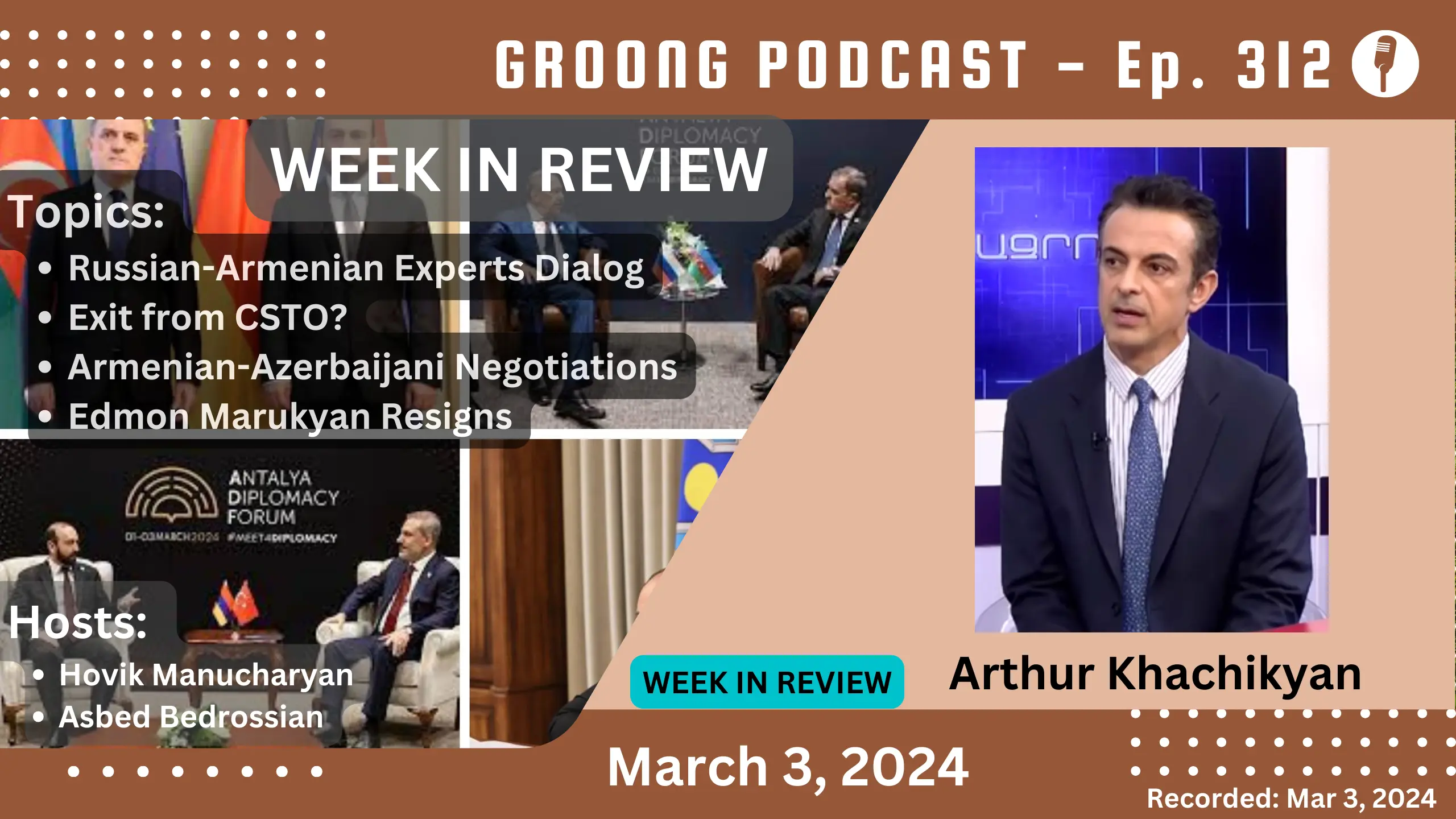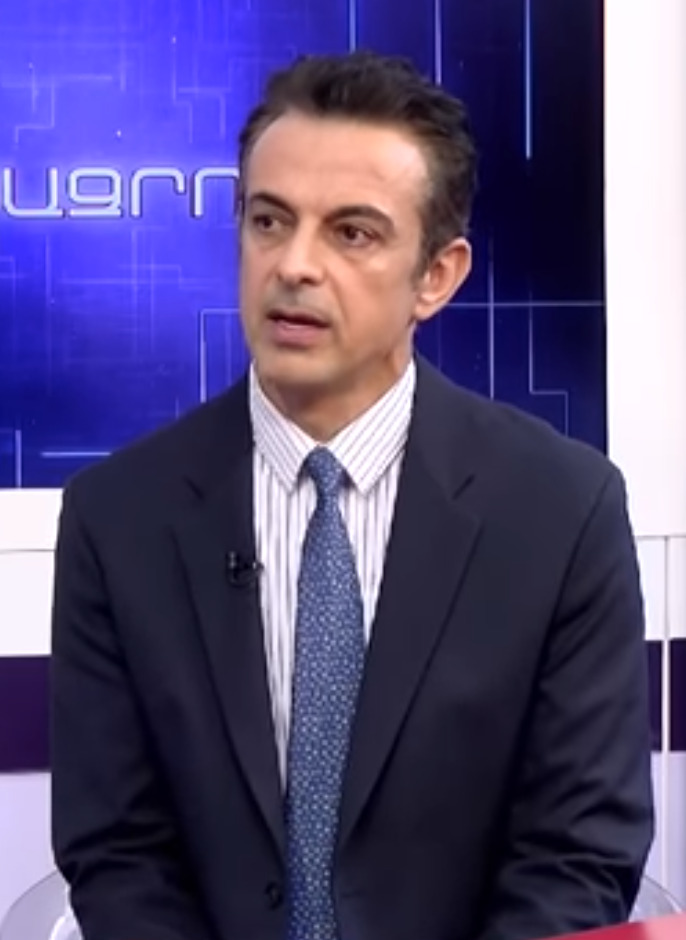
Groong Links:
Guest:
Topics:
- Remembering Sumgait Pogroms
- Russian-Armenian Experts Dialog
- Exit from CSTO?
- Armenian-Azerbaijani Negotiations
- Edmon Marukyan Resigns
Episode 312 | Recorded: Mar 3, 2024
Show Notes
Expert Discussions on Russian - Armenian Relations
Arthur last week we were talking with Sergei Melkonian about the Russian-Armenian experts dialogue that was held in Yerevan on February 24, where Russian and Armenian experts discussed the state of relations between the two countries. You were also there, so we thought we’d ask you the same as we asked Sergei.
Question:
- What was your overall impression of the dialogue?
According to some Russian experts on the panel, Russia is currently conducting a “damage control” policy with regard to Armenia. In other words, a passive policy. At the same time, some of the experts blamed Armenia for the worsening relations.
Questions:
- Were you able to detect any introspection by the Russians?
- Do any of them accept that some of their own policies contributed to damaging the Armenian-Russian relationship?
Sergei mentioned that Russian analysts generally agree that Russia’s decision to not support the Armenian opposition in 2021 was a mistake.
Question:
- Do you have more thoughts on that point that you can expand on?
Exit from CSTO?
Just this past week, in highly publicized comments to the Armenian parliament, Pashinyan said that he was ready to pull out of the CSTO, and that the CSTO had become a “security threat” for Armenia. And to France24, he said that Russia fomented unrest in Armenia after the ethnic cleansing of Artsakh in September 2023, hoping to cause a regime change.
Questions:
- What’s the sense of the experts’ about such comments?
- If Armenia were to formally exit the CSTO, what are the immediate dangers facing us?
Armenian-Azerbaijani Negotiations
This past week Mirzoyan met with Bayramov in Berlin. After two days of discussions, apparently no results were achieved and “open issues remain”. Azerbaijan is demanding Armenian legislative and constitutional changes, and at least in words, these are preconditions for signing an agreement.
Pashinyan’s government, also at least in words, is rejecting this. Note that they are not saying that they’re not going to make the changes to the Armenian constitution which will meet Aliyev’s demands, but they’re saying that their changes are not related to Aliyev’s demands.
Questions:
- Where do negotiations with Azerbaijan stand? What are the “open issues”, and why is nothing being achieved?
- How high is the risk of war on Armenia?
Antalya Diplomatic Forum
From Munich, both foreign ministers flew to Antalya for the annual diplomatic conference. Mirzoyan met with Turkish FM Hakan and reportedly discussed “normalization”.
Turkey has made it clear that “normalization” won’t go forward until Armenian capitulates to Azeri demands. What I read in their statements is that until Armenia hands over Syunik to Azerbaijan and becomes a city-principality centered around Yerevan, nothing’s going to move. Yet Pashinyan’s government goes around in circles promising and “hoping” that progress will soon be made, and Turkey will open a land border with Armenia.
Questions:
- First of all: why? Do the Armenian people believe that an open Turkish border will be a panacea for something?
- Whose agenda benefits from an open border with Turkey?
In Antalya, Lavrov and Bayramov also met. Guess what they talked about? They highlighted their agreement about the importance of implementing the Nov. 2020 trilateral agreement. Certainly they are talking about point 9.
There has been a systematic failure to implement that agreement from points 1 through 8. If I were the leader of Armenia I’d be responding that we can talk about point 9, right after points 1 through 8 are implemented. And this means putting 144 thousands Artsakhtsis back in their homes, opening the Lachin/Berdzor corridor, repatriating all Armenian POWs back to their families, and more.
Question:
- What’s an appropriate response to Russia and Azerbaijan about this trilateral agreement pressure?
Earlier you said that Russia sees Turkey as a counter-balance to the west. The following statement statement comes from Toivo Klaar, EU Special Representative for the South Caucasus, in Antalya:
In addition to the involvement of the EU, we are also waiting for Turkey and its regional leadership to become involved. "Ankara can have a strong influence in opening communication channels in the region and asserting the role of its dominant power in the region,"
Questions:
- What should we make of this statement?
- Is it reasonable for anyone today to question Turkey’s loyalties to the West and NATO?
Edmon Marukyan Resigns
Since 2022 Edmon Marukyan has been an “ambassador-at-large” for Pashinyan. Most of what we see as output from him are tweets and statements that generally appear to be something Pashinyan wanted to say, but didn’t want it to come from the prime minister’s office. Despite the fact that Marukyan led the opposition Bright Armenia party, Լուսավոր Հայաստան, most observers do not consider him or the party a true opposition to Pashinyan.
On Friday Marukyan cited “foreign policy differences” as the reason for parting ways with Pashinyan. He has not elaborated on what those differences are.
Questions:
- Is this a serious parting of ways, or could there be a more hidden agenda behind this resignation? For example I read a 168 article which was speculating the possibility of running for office in a presumed “early election”?
- Can you guess what these “foreign policy differences” be? There haven’t been any notable changes in the Pashinyan administration’s foreign policy over the past year. Why at this time?
Topics from the Panelists
- Hovik: Armenia’s suicidal behavior during Russia/West global crisis
- Arthur: How will we pull ourselves out of this morass, who will step up?
- Asbed: Edmon Marukyan, come on our show and explain your resignation
Wrap-up
That’s our Week in Review, we hope you found it helpful. We invite your feedback and your suggestions, you can find us on most social media and podcast platforms. Thanks to Laura Osborn for the music on our podcasts.
Guests

Arthur Khachikyan
Dr. Arthur Khachikyan, an International Relations expert from Stanford University, specializing in intervention.
Hosts

Hovik Manucharyan
Hovik Manucharyan is an information security engineer who moved from Seattle to Armenia in 2022. He co-founded the ANN/Groong podcast in 2020 and has been a contributor to Groong News since the late 1990s.
Disclaimer: The views expressed by Hovik Manucharyan on the ANN/Groong podcast are his own and do not necessarily reflect the opinions of his employer or any other organization.

Asbed Bedrossian
Asbed Bedrossian is an IT professional, and for years oversaw the central IT enterprise infrastructure and services at USC. His decades of experience spanned across IT strategy, enterprise architecture, infrastructure, cybersecurity, enterprise applications, data center operations, high performance computing, ITSM, ITPM, and more.
Asbed founded the Armenian News Network Groong circa 1989/1990, and co-founded the ANN/Groong podcast in 2020.